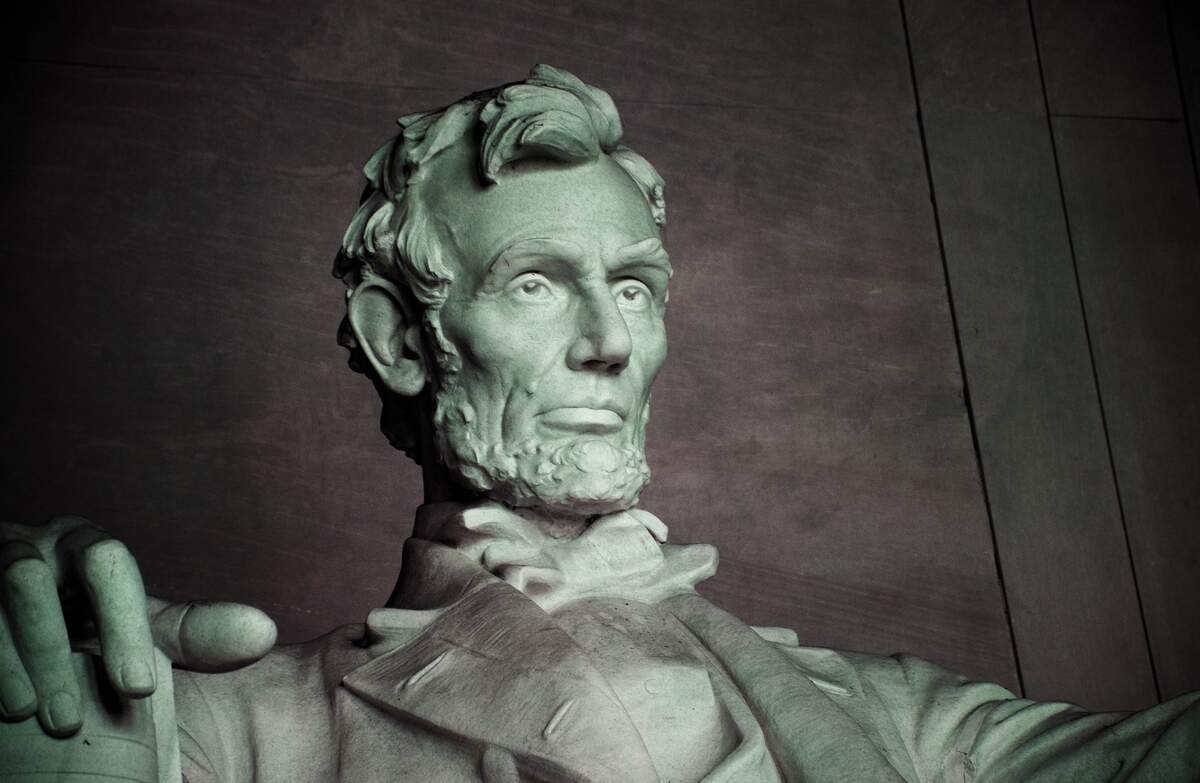

Lincoln's Birthday
Also known as
Abraham Lincoln's Birthday
Abraham Lincoln Day
Lincoln Day
Observed
annually on February 12th
Dates
Hashtags
Sources
Abraham Lincoln, the 16th President of the United States, was born on February 12, 1809. Over the years, he has become known as one of the greatest American presidents of all time. At the time of his death, in 1865, many saw him as a martyr, and it wasn't too long afterward that his birthday began being observed informally. In the mid-1870s, Julius Francis of Buffalo, New York, began honoring Lincoln on his birthday and petitioned Congress to make the day a legal holiday.
But, as of 2019, Lincoln's Birthday is not, nor has it ever been, its own federal holiday. On the state level, a handful of states celebrate Lincoln's birthday on its actual date. In recent years, it has been celebrated as a state holiday in Ohio, Missouri, New York, Illinois, and Connecticut. It is celebrated as such in California as well, but since 2009, it has no longer been a paid holiday there. Some states, Indiana being one example, have officially celebrated Lincoln's birthday, but not on the actual date of his birth. In prior years, more states officially celebrated his birthday; twenty-four states celebrated it in 1940, and ten celebrated it in 1990.
Although Lincoln's Birthday is not celebrated on its own on the federal level, it is often implicitly or explicitly celebrated as part of Washington's Birthday, which is usually called Presidents' Day, taking place on the third Monday in February. In some states, this holiday is known as Washington and Lincoln Day. However, there are other variations of the day; some states specifically celebrate only Washington, and some celebrate Washington and another president, such as Thomas Jefferson.
Besides state observances and informal federal observances, Lincoln's Birthday is celebrated at many places associated with him. Each year, there is a wreath-laying ceremony at the Abraham Lincoln Birthplace National Historical Park in Kentucky. Since its dedication in the early 1920s, there has also been a wreath-laying ceremony at the Lincoln Memorial, which is organized by the Lincoln Birthday National Commemorative Committee and the Military Order of the Loyal Legion of the United States. The reading of the Gettysburg Address is also a part of this event. For his bicentennial, on February 12, 2009, the Abraham Lincoln Bicentennial Commission organized a special event at the Lincoln Memorial. That same day, four new Lincoln pennies were released, with backs that depicted different stages of Lincoln's life. Each year on the day, events are also held at the Abraham Lincoln Presidential Library and Museum in Illinois. The Republican Party holds Lincoln Day dinners around the date because Lincoln was the first Republican president.
Abraham Lincoln was born in a one-room log cabin just south of present-day Hodgenville, Kentucky. When he was two, his family moved to Knob Creek Farm, which is northeast of Hodgenville. In 1816, he moved with his family to Indiana. He did not get much schooling while growing up and often had to work to help support his family, doing things such as farming and splitting rails for fences.
In 1830, his family moved to Macon County, Illinois. He got a job on a boat, hauling freight down the Mississippi River to New Orleans. He then settled in West Salem, Illinois, where he worked as a shopkeeper in a store as well as a postmaster. In 1832, he was a captain in the Black Hawk War and ran for a spot in the Illinois state legislature, which he lost. However, he ran again in 1834 and was successful. As a member of the Whig Party, he was influenced by other Whigs such as Henry Clay and Daniel Webster. Some policy positions he held at the time were in opposition to slavery's spread to the territories, and a goal of expanding the United States with a focus on commerce and cities.
Lincoln decided to teach himself law and passed the bar in 1836. Shortly thereafter, he moved to Springfield, a few years before it became the state's capital. He married Mary Todd in 1842; they had four sons together, although only one would live into adulthood. Lincoln was elected to the U.S. House of Representatives in 1846, but pledging to serve only one term, he returned to Springfield in 1849. His opposition to the Mexican-American War is the most remembered element of his term.
Politics were in Lincoln's blood, and he decided to return to them in 1854. That year, Democrat Stephen Douglas had helped get the Kansas-Nebraska Act passed, which said there should be popular sovereignty when it came to slavery in the territories, meaning that voters should be able to decide for themselves if slavery should be allowed in them. On October 16, 1854, in Peoria, Illinois, Lincoln debated Douglas about the act. During the debate, he spoke against slavery and said it was incongruous with the Declaration of Independence. That same year, he joined the recently formed Republican Party, a party that was created in large part on the belief that slavery should not expand into the territories.
In 1858, Lincoln ran against Stephen Douglas for a U.S. Senate seat in Illinois. In June, he gave his house divided speech, which said the country couldn't go on existing half slave and half free. Lincoln lost the race but gained national recognition, in part because of the debates he had with Douglas.
The Republicans nominated Lincoln as their candidate for president in the 1860 election. It was a four-way race: Stephen Douglas was the nominee of northern Democrats, John C. Breckenridge was the nominee of southern Democrats, and John Bell was the nominee of the Constitutional Union Party. Breckenridge and Bell split the southern votes, and Lincoln won most of the north. He won the electoral vote count, and thus the presidency. By the time he had taken the oath of office in March 1861, seven states had already seceded from the Union; the Civil War began the following month.
The Civil War engulfed Lincoln's presidency, but he proved to be an adept war leader. After George McClellan failed to pursue the Confederate Army after the Union victory at Antietam in September 1862, Lincoln removed him of his position of Commanding General. Lincoln also issued the Emancipation Proclamation after Antietam, which went into effect on January 1, 1863, freeing slaves in the southern states (slaves in the border states loyal to the Union were not freed). The emancipation laid the groundwork for slaves to be freed everywhere—the Thirteenth Amendment went into effect in 1865, after Lincoln's death.
In November 1863, Lincoln delivered the Gettysburg Address at a dedication of the national cemetery at Gettysburg. It became one of the most famous speeches in American history. Although Lincoln has been lauded for fulfilling the commander-in-chief role, he did so not completely without controversy, as he suspended habeas corpus.
In 1864, Lincoln faced the general he had relieved, George McClellan, in his bid for reelection. He prevailed, and at his second inaugural he spoke of the end of the war, and the need for a conciliatory reconstruction "with malice toward none; with charity for all." On April 9, 1865, Confederate commander Robert E. Lee surrendered to Union Commanding General Ulysses S. Grant at Appomattox Court House. Two days later, Lincoln gave a speech on the White House lawn.
On April 14, which happened to be Good Friday, President Lincoln was shot in the back of the head by John Wilkes Booth while at Ford's Theatre. He died early the next morning at a boarding house across from the theatre. Today we remember his remarkable life and his contributions to the United States at such a difficult time in its history.
How to Observe Lincoln's Birthday
The following are some ways to celebrate Lincoln's Birthday:
- Visit the Abraham Lincoln Birthplace National Historical Park. This encompasses both his birthplace south of Hodgenville, as well as Knob Creek Farm, where he lived next. A wreath-laying ceremony takes place at the park.
- Stop at the Lincoln Museum in downtown Hodgenville as well as the nearby Abraham Lincoln Statue.
- Stop at other places along the Kentucky Lincoln Heritage Trail.
- Attend the wreath-laying ceremony at the Lincoln Memorial.
- Visit the Abraham Lincoln Presidential Library and Museum and The Lincoln Tomb in Springfield, Illinois.
- Stop at the Lincoln Boyhood National Memorial in Indiana or at the Abraham Lincoln Library and Museum in Tennessee.
- Go to Ford's Theatre.
- Read a book about Lincoln.
- Read some of Lincoln's own writings and speeches.





















